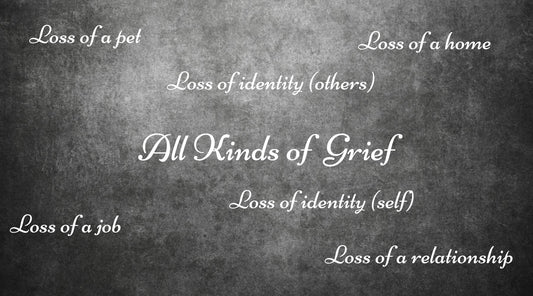What I’ve learned can help leaders and coworkers alike.
In less than two months of graduating from college, I experienced my first coworker’s death. Unfortunately, that wouldn’t be the last one. So far I have dealt with grieving for coworkers 7 more times.
The number one thing I have learned is:
Death in the workplace is very different from the death of loved one. And I have had my share of loved ones’ deaths too.
For far too long people have tried to separate their personal and work lives, especially dealing with grief. A lot of people, myself included have used their work as an escape from their grief.
When a coworker dies, it forces worlds to collide. And often in my vast experience with dealing with my other grieving coworkers, people feel like they don’t have a right to grieve their coworker’s death.
And I want and need you to hear this.
You have the right to grieve a coworker’s death
Your grief and another coworker’s grief might look different and that’s okay. Both of you are experiencing this death differently.
Your grief will be complicated
When you grieve for a coworker you are grieving for them as a person, and how they affected your work life.
It becomes even more complicated when a lot of times their work still has an immediate need to get done. And you might not be able to grieve right away.
When my coworker was murdered, she had worked in the payroll department. Payroll still had to get out. After the first week of our shock, I had enough knowledge of what she did, to be asked to step in and help out the payroll department.
There were a lot of conflicting emotions for me. On one hand, I knew I was better than bringing in someone from a temp agency who had no idea what was going on. But I also knew, I only knew a tiny fraction of what she did. I so wanted to honor her memory by doing things correctly. And I wanted to be of service to my other coworkers, but I felt lost. On a logical level I knew my coworkers knew I didn’t have a lot of experience, but it was a challenging time for me.
When you have to fill in temporarily for the coworker who passed
Do your best. You are going to get things wrong. Your knowledge and possibly even your skill set is different from the person who passed. As much as you are able to, ask for help from your remaining coworkers. They know you don’t know 100% of what that person’s job or responsibilities were. They also probably don’t know either. It is okay to brainstorm on how to solve a problem your coworker did multiple times a day. Just because it was easy for them doesn’t mean it will be easy for you to immediately pick up and do.
For more on dealing with a coworkers death check out our blog posts
Death of a Coworker, Now what (Part 1 of 2) and
Death of a Coworker, Now what (Part 2 of 2)

For all the managers, directors, and leaders out there, keep reading
Beyond dealing with my own grief for my coworkers, I have emotionally supported and comforted hundreds of people dealing with death in the workplace. No matter my job title, no matter if I know the person personally or not. People come to me with their grief.
The number one complaint I hear when a coworker dies is: Management didn’t handle the death sufficiently.
I get it, on a good day death isn’t something most people want to talk about. And I also know when an employee dies, you as the leader have to think about the company and minimize as much upheaval as possible.
But, more importantly, your staff is human and this will affect them on a personal level.
If, at all possible, tell people in person (or via Zoom or a conference call) about the death
You might think email is an efficient way to notify everyone all at once, but it comes across as uncaring and not personal.
Instead of sending an email telling people about the death, send out a calendar invite for a quick mandatory meeting in the next 5 or 10 minutes. Doing this in a short time frame allows people on conference calls to quickly wrap the meeting. It also minimizes the time people are asking you what the meeting is about.
I’ve been around corporate America long enough to know people sometimes are already double or triple booked in meetings. However, this is one of those times you need to have an in-person meeting. It makes a big impact on your staff.
I also understand you might have some potential fears of speaking to your staff right away.
You might be afraid of having to look at people when you give them the bad news
Leadership is about doing the hard emotional work too. You chose to become a manager, a director, a boss, a leader. Now more than ever you have to lead with compassion. This is a time when your strength of character is going to be tested.
As you prepare to give your staff the news, really think about how you would like to be told about a coworker’s death. What you have experienced in your career from your own managers. Who handled delivering bad news in a compassionate way? What can you model from them? Or conversely what is something you don't want to repeat on how a prior manager broke bad news.
You might be afraid of showing emotion
Chances are you are affected by this death too. And you might be having a hard time trying to find the words to tell your staff. But hiding behind an email, doesn’t work. It's okay to let your staff know this death is affecting you. You are human too. If you only send out an email, true or not, the overall perception is you don’t really care about this death or your staff. And from listening to hundreds of people, this one communication is remembered for years.
Follow up with an email
After you have told people the news in person, then follow up with an email. Reiterating what was talked about in the meeting. If there are any known next steps or if not, state that as well.
After you told your initial group let other groups know as soon as possible.
If there are people not on your team, but the deceased might have had several interactions with, try to do another in-person meeting if possible. Chances are there are several people in the broader group which knew the deceased quite well.
Sometimes it’s easy to forget as leaders, that coworkers spend a lot of time together. When there is a death, the details of how that death is being handled ripples through the entire staff quickly. Come from a place of compassion as best you can.
If you work for a large company, send emails to other managers and letting them about the death. Asking them to discuss it with their own staff is very helpful for a few of reasons. One is that they or their staff may have worked directly with this person and need to know the news. But even if, they haven’t worked with this person, chances are they are going to want to help and support your team through this. By them knowing it helps give your team a bit more grace through this time.
You might be afraid of the massive amount of questions you are going to get
As a leader, you most likely want to have answers before you present information to your staff. This is one of those times you won’t have all the answers right away. Quite possibly you’ve just learned about this death yourself.
Be upfront with your staff about this. And tell them as much as you do know.
The more authentic, compassionate, and honest you are with your staff, the more your staff will be appreciative and be more willing to help during this difficult time.
This post is dedicated to Dean, Karen, Helen, Jo, Micheal, Deb, Rebecca, and Dan with all my love.
***Blog was originally published on Medium by Tara Wilken; updated here Sept 2023***




